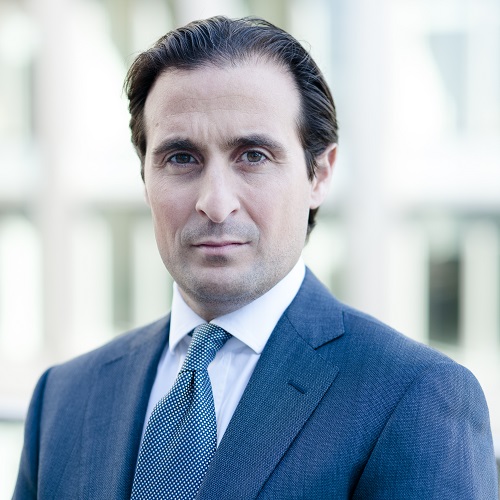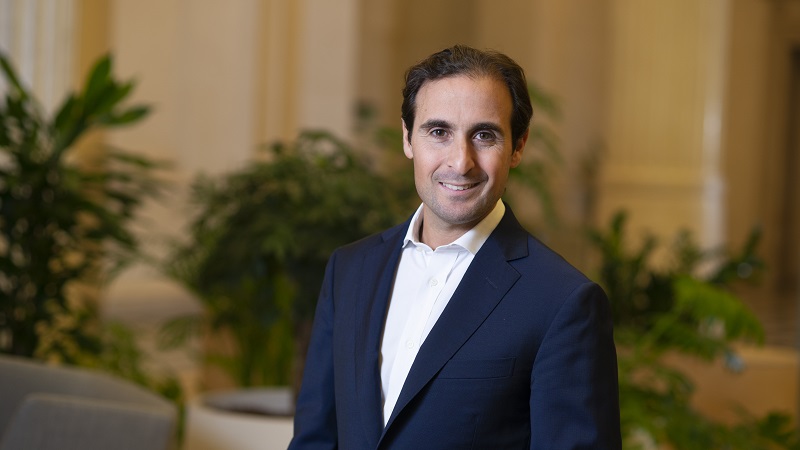David Esfandi is clearly a man who knows what he likes. During our pre-lockdown breakfast together he sends back no fewer than four cups of coffee because they are too cold.
They have probably cooled because he is doing a lot of the talking – there is a lot to discuss – but aside from learning he likes hot coffee, I’m given a glimpse into his attitude towards leading the UK and European arm of Canaccord Genuity Wealth Management (CGWM).
“I’m not usually like this,” he says, laughing, and I believe him, given the firm-but-friendly way he apologetically deals with the waiter each time.
Esfandi, recently crowned CEO of the Year at the City of London Wealth Management Awards, joined CGWM in 2014 and his tenure to date has been marked by the acquisition and integration of three businesses in the past two-and-a-half years.
Adding the Warren Buffett of UK small cap
CGWM bought stockbroking firm Hargreave Hale in September 2017 before adding Worcester-based IFA McCarthy Taylor in January 2019 and the UK wealth management arm of Thomas Miller the following March. Esfandi says this spell of inorganic growth has not just been a case of buying scale for the sake of it; but about scale with differentiation, or “growing intelligently”.
The addition of Hargreave Hale, for example, introduced the firm first to domestic stockpicking capabilities, particularly in the small-cap space. “We essentially have the Warren Buffett of UK small cap in our office managing the Marlborough funds in Giles Hargreave,” says Esfandi.
It also gave the firm a regional presence and ability to scale nationally that CGWM didn’t have previously, being located in London and the Channel Islands.
Lessons learnt from Hargreave Hale FCA fine
But in February 2019, Hargreave Hale was fined £306,300 by the Financial Conduct Authority as one of three firms, together with River and Mercantile Asset Management and Newton Investment Management, for breaching competition law relating to its participation in an IPO and market placing in 2015.
Clearly not wanting to talk too much about it, Esfandi says CGWM was well aware of the situation before the acquisition. “We learnt through it and have long moved on from that.” But when pushed a bit further, he says: “What we did after our Hargreave Hale transaction was ensure there was a forever- compliant presence within the fund management team. So if there is ever a shred of doubt, ask compliance. That was a big lesson learned. And that’s what we implemented on day one of our acquisition.”
The McCarthy Taylor acquisition allowed CGWM to bolster its Worcester office, which it had acquired via Hargreave Hale and which now has around £900m of assets under management. This also introduced a financial planning element to the business.
The “final piece of the jigsaw” was the Thomas Miller acquisition, which Esfandi says “really cemented our capabilities as a financial planner”. He alludes to a business development saying in Canada, where CGWM’s parent is based, of “growing share of wallet”. The answer to how to do this, he says, is resoundingly to use financial planning.
“Thomas Miller, I’m really confident has been a really good strategic move,” he adds. “We have an obligation to offer that service: inheritance tax planning, pension planning, etc. That’s a big challenge we’re trying to focus on this year.”
Esfandi says all of the acquisitions added scale but that they also had to bring other things to the business. There have been other acquisition opportunities along the way, he explains, without mentioning names, that would have offered scale and maybe would have been easier to integrate. But they didn’t provide an “extra dimension” that would stand the firm in good stead for the next decade.
In terms of acquisitions, that’s it for now, Esfandi assures me. He is always looking for opportunities but there is nothing in the pipeline. “I would say the next year or two is all about growing intelligently: how can we cement what we have? Integration is basically over and now it’s really about the future of what is a different business.”
Motivating staff to deliver better client service
Esfandi thinks one of the toughest issues for wealth managers is growing organically. He looks at some companies that have grown their assets but questions at what level of fees. So, what’s his strategy?
“I don’t have a magic wand,” he admits. “If I had a really high-conviction answer I probably wouldn’t be here right now. It’s just as hard as picking a stock and having a 75% success rate. We’re going to give it our best bet.”
The key, Esfandi thinks, is to motivate staff to increase their client book. “How do we incentivise a manager who’s got a very good lifestyle already and motivate them to do more and deliver a better service to clients?”
The company is focused on three things to make it a happy, productive place: internal culture, investment performance and client culture. A big effort right now is focusing on a group of 25 to 30 staff members who have the capacity to grow their books and helping them do this.
“Someone managing £60m of assets under management with maybe 50 clients can double that given our technology,” he says. “Give them the tools and the confidence to go out there and do it and it’s really about a tweak in outlook.”
But how do you both keep staff happy and avoid a St James’s Place-type scenario where sales incentives allegedly included luxury cruises and cufflinks?
“We’ve got to strike the right balance between being overly cautious – we are a business at the end of the day – and being content with zero organic growth. But being overly sales driven when you have sensitive, if not vulnerable, clients on the other end is a very sensitive area.
“You have to be judicious. We won’t be having lavish trips to celebrate huge AUM growth from our sales representatives.”

Growing organically, according to Esfandi, involves thinking about the future and filling what he terms the “mini chasm” for clients who want to stay with a traditional wealth manager but be given the tools to have access to the investment process online.
“You still want to stay with the traditional wealth manager and need that person in the middle but your likes and tastes will be different. You might want a passive or an ESG service but be able to onboard yourself online because you’re on your travels, but be able to call someone if required. That’s what I call the middle ground.”
You cannot remove face-to-face contact, he stresses, but this approach may replace three face-to-face meetings with one. “It will save a lot of preparation time for the investment manager and the client. It will also allow our investment manager and our financial planner see more clients.”
He adds: “I do think D2C has a long way to go and feel it’s a massive mistake to bury our heads in the sand and say things aren’t going to change. And that’s our answer to the change.”
Esfandi mentions the D2C marketplace but does not see robo-advice as a threat to CGWM’s model; in fact, he views it as an opportunity that is not to be missed. He explains how Avaloq software has helped the firm deal with the basics when it comes to its digital operations.
“We’ve lived and breathed Avaloq for a couple of years. Now’s the time to deliver that B2B opportunity. We’re trying to attract the £1-3m executive, who is maybe 10 to 15 years younger than the stereotypical client we have now.”
Esfandi expects within the next couple of years that CGWM will offer “a more seamless, frictionless, cheaper, more progressive” service to both the existing generation of clients, but especially the next generation.
“If we’re not going for that, then I’m not doing my job.”
Not following the example of Alex Ferguson
So how does Esfandi judge success as the CEO of a wealth management business, or indeed any CEO?
“A successful CEO is someone whose business is still flourishing after they are gone. Look at Manchester United. I don’t think Alex Ferguson should be proud of the fact that the moment he left, the business wasn’t doing well.”
Esfandi is still young for someone in his position so it’s perhaps too early to think about a succession plan, but surely he subscribes to his own medicine?
“We’ve got a lot to do before we get there but I do think that any successful business and CEO needs to put a succession plan in place.”
His overriding message, as he sips his piping hot coffee? “Don’t get comfortable. Comfortable isn’t good. When I get comfortable, I get itchy.”










